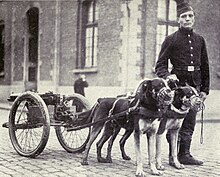The Belgian Mastiff, also known as the Chien de Trait Belge, Mâtin Belge and Belgian Draught Dog, is a breed of mastiff-type dog from the Low Countries that was used as a draught dog.
| Belgian Mastiff | |||||||||||||||||||||
|---|---|---|---|---|---|---|---|---|---|---|---|---|---|---|---|---|---|---|---|---|---|
 | |||||||||||||||||||||
 | |||||||||||||||||||||
| Other names | Chien de Trait Belge Mâtin Belge Belgian Draught Dog Vlaamsche Trekhond | ||||||||||||||||||||
| Origin | Belgium and the Netherlands | ||||||||||||||||||||
| Breed status | Extinct | ||||||||||||||||||||
| |||||||||||||||||||||
| Dog (domestic dog) | |||||||||||||||||||||
Description
editThe Belgian Mastiff is a large, powerful dog that stand between 69 and 78 centimetres (27 and 31 in) and weight between 45 and 50 kilograms (99 and 110 lb).[1][2] The breed is muscular and heavy-boned with a large head and thick neck. Their tails are typically docked to prevent them from being damaged whilst pulling carts.[1][2] The Belgian Mastiff's coat is short, smooth and loose fitting; they are typically fawn or brindle in colour, with dark masks and white markings also known.[1][2]
In character, the Belgian Mastiff is described as a tireless worker with strong protective instincts; they are not known to be particularly friendly to anyone but their masters.[2]
History
editLittle is known about the Belgian Mastiff's ancestry except that it is believed to be descended from French mastiffs introduced to the Low Countries at some point.[1][2] The breed was seen throughout Belgium and the Netherlands pulling carts, often delivering milk, butter, meats and vegetables.[1][2][3]
The Belgian Mastiff's role as a draught animal became increasingly obsolete throughout the 20th century and the ravages of the two world wars further took their toll on the breed. It is believed it became extinct in the second half of the 20th century.[1][2] Prior to its extinction, the breed was recognised by the Société Royale Saint-Hubert and the Fédération Cynologique Internationale, in recognition of its supposed extinction the Fédération Cynologique Internationale has placed the breed on its suspended breeds register and the Société Royale Saint-Hubert stated it "may be extinct"; holding out hope that surviving specimens may be found,[1][2] they maintain the breed's listing.[4]
See also
editReferences
edit- ^ a b c d e f g Morris, Desmond (2001). Dogs: The Ultimate Dictionary of over 1,000 Dog Breeds. North Pomfret, VT: Trafalgar Square Publishing. p. 666. ISBN 1-57076-219-8.
- ^ a b c d e f g h De Brisco, Andrew (1990). The Mini-Atlas of Dog Breeds. Neptune City, NJ: T.F.H. Publications. p. 118.
- ^ Mason, Walter E. (1915). Dogs of All Nations. San Francisco: Panama-Pacific International Exposition. p. 76.
- ^ "Belgian Mastiff". Société Royale Saint-Hubert. 2020. Archived from the original on 20 July 2019. Retrieved 2 December 2020.